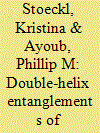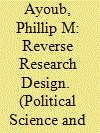|
|
|
Sort Order |
|
|
|
Items / Page
|
|
|
|
|
|
|
| Srl | Item |
| 1 |
ID:
193481


|
|
|
|
|
| Summary/Abstract |
The rights of people who are marginalised by their sexual orientation and gender identity (LGBTI) have improved in many countries. Largely, these achievements can be traced back to the ‘spiral model’ of factors including transnational mobilisation by the LGBTI rights movement, the actions of a few pioneering governments, and advances in the human rights frameworks of some international organisations (IOs). Yet a rising and increasingly globally connected resistance works against LGBTI rights. It rests predominantly in the hands of a transnational advocacy network (TAN) that attempts to lay claim to international human rights law by reinterpreting it. Drawing on a decade of fieldwork and 240 interviews with LGBTI, anti-LGBTI, and state and IO actors, this article explores how the conservative TAN functions, in terms of who comprises it and how its agenda is constructed. We argue that this TAN has employed many of the same transnational tools that garnered LGBTIQ people their widespread recognition. It also conforms to the spiral model of rights diffusion, but in a process we call a double helix. As the double-helix metaphor suggests, rival TANs have a reciprocal relationship, having to navigate each other’s presence in an interactive space and thus using related strategies and instruments for mutually exclusive ends.
|
|
|
|
|
|
|
|
|
|
|
|
|
|
|
|
| 2 |
ID:
178993


|
|
|
|
|
| Summary/Abstract |
How do mass publics react to lesbian, gay, bisexual, and transgender (LGBT+) advocacy efforts in socially conservative societies? We consider how the first-ever LGBT+ Pride in Sarajevo, Bosnia and Herzegovina influences ordinary citizens’ attitudes and behavior regarding LGBT+ support. Using nationwide and local panel surveys, we find that support for LGBT+ activism increased locally after the Pride but did not diffuse nationwide, signaling how proximity mechanisms reinforce Pride effects. In survey experiments, we show that subjects are responsive to both mobilization and counter-mobilization appeals by local activists. We also find evidence from a behavioral experiment that the Pride had a positive effect on shifting the allocation of financial resources toward local pro-LGBT+ activists and away from opposition groups. Finally, in-depth interviews with local LGBT+ activists underscore the challenges facing LGBT+ activism in socially conservative societies but also point to the substantial possibilities of collective action on behalf of minorities at risk.
|
|
|
|
|
|
|
|
|
|
|
|
|
|
|
|
| 3 |
ID:
184526


|
|
|
|
|
| Summary/Abstract |
Teaching research design is a core component of a political science curriculum. In our pedagogy, we often do two things separately: expecting students to (1) read and digest the work of established scholars, and (2) explore their own interests in the form of a research design or research paper. In a reverse research design, I bridge these two components with a pedagogical tool. I use a published book or article relevant to the course and students retrace the published author’s process, placing themselves in the author’s shoes. Rewinding some years, students imagine that they are this author writing a grant proposal to conduct the (now-completed) study. This helps students to work through the steps of research design, putting aside until later the more intimidating hurdle of articulating their own research question and project. This article explains reverse research design and describes the teaching resources and methods for implementation.
|
|
|
|
|
|
|
|
|
|
|
|
|
|
|
|
|
|
|
|
|